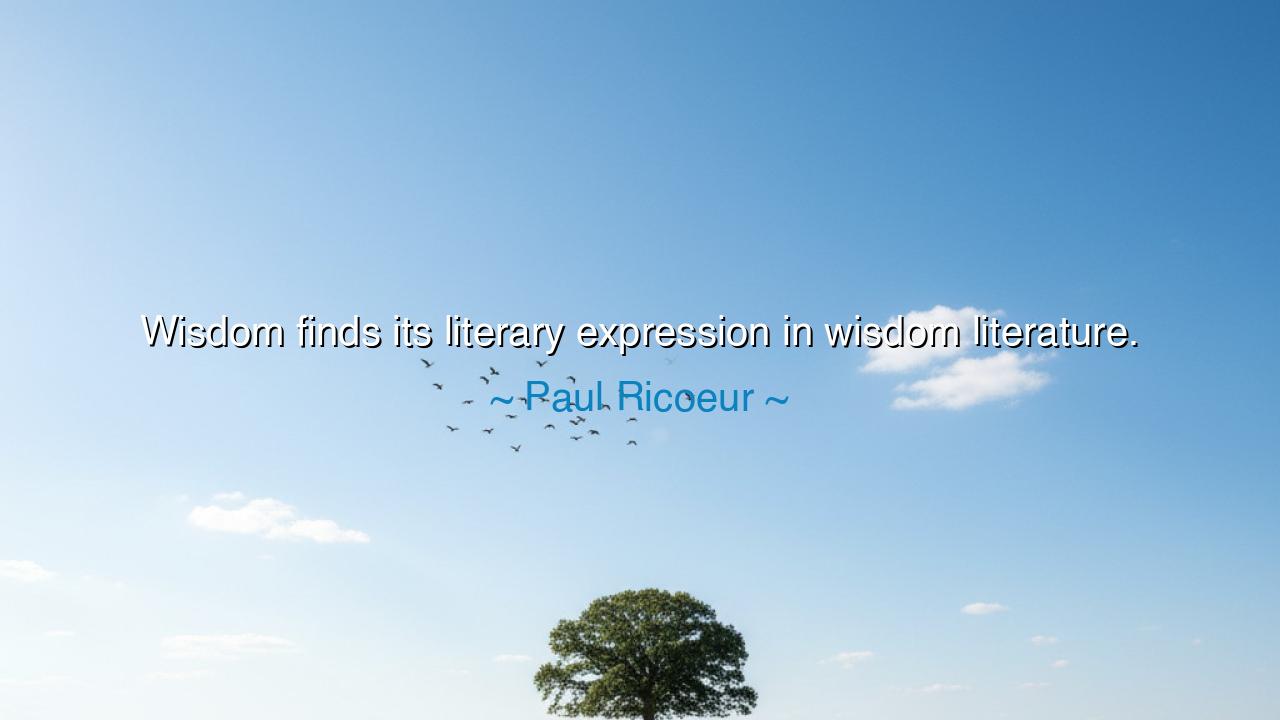
Wisdom finds its literary expression in wisdom literature.






Hearken, O children of reflection, to the words of Paul Ricoeur, who illumined the sacred bond between wisdom and its manifestation in the written word. He teaches that the deepest truths of the soul, the insights garnered from experience and contemplation, do not dwell solely in thought—they find their literary expression in wisdom literature, crafted to endure across the ages. Here lies a teaching for the generations: that knowledge of life, tempered by reflection and moral insight, seeks form in story, aphorism, and parable, that it may guide those who come after.
The origin of this reflection springs from Ricoeur’s life as a philosopher and interpreter of human understanding, a scholar who pondered the ways in which meaning is transmitted. He observed that cultures throughout history have not merely thought of wisdom abstractly; they have preserved it in texts—scriptures, proverbs, epics, and philosophical treatises—so that the lessons of experience, virtue, and discernment might illuminate the minds of future generations. In his view, literature is the vessel of human insight, carrying the essence of wisdom across the ages.
The meaning of this aphorism resonates with profound simplicity: wisdom without expression risks fading into silence, while literary expression grants it life, shape, and permanence. It is through words that insights into justice, courage, temperance, and the human condition are shared, debated, and internalized. To read the ancient proverbs or epic tales is to encounter the distilled experience of countless souls, whose literary voice continues to teach, caution, and inspire.
History provides testimony to Ricoeur’s insight. Consider the Book of Proverbs in the Hebrew Scriptures, where timeless truths regarding virtue, prudence, and human behavior are preserved in succinct, memorable phrases. These teachings, rendered in literary form, guided generations in the discernment of right action, illustrating that wisdom, when expressed through carefully wrought words, transcends the limitations of time and place. The text becomes not merely instruction, but a dialogue between the ages.
Moreover, this truth extends beyond sacred scripture. The Meditations of Marcus Aurelius offer another example, wherein the Roman emperor, amid the burdens of power, wrote reflections that crystallize the essence of stoic wisdom. Here, literature becomes the medium through which the trials of life are examined, understood, and imparted. Ricoeur reminds us that literary expression is not ornament, but the natural home of enduring insight.
O generations yet to come, treasure this counsel: wisdom seeks form, and literature is its vessel. Through the written word, the experiences, lessons, and discernments of the past become accessible to the present and the future. To engage with wisdom literature is to commune with minds across centuries, to hear their guidance, and to allow their insights to shape the soul. In this, Ricoeur’s words echo through time: the deepest truths of humanity demand expression, that they may illuminate, instruct, and endure.






HAhk ak
This statement makes me reflect on the permanence and accessibility of wisdom through writing. Does Ricoeur suggest that literary expression allows wisdom to transcend individual experience and reach a broader audience? I’m curious whether the translation of wisdom into literature risks simplification or distortion, or if it amplifies understanding by engaging the imagination. How might modern digital media or other forms of expression compare in preserving and transmitting the insights traditionally found in wisdom literature?
NLTran Nguyen Nhat Linh
Reading this, I question how wisdom literature differs from other literary works. Is the defining feature the content, the intent, or the effect on readers? I’d like to consider whether wisdom literature serves primarily an instructive function, offering guidance and ethical reflection, or whether it also inspires critical thinking and self-exploration. How do cultural, historical, and philosophical contexts shape the ways wisdom is written and interpreted?
ATChau Anh Thai
I’m intrigued by the idea that literature can serve as a vessel for wisdom. Does this imply that the form, style, and narrative techniques of writing shape how wisdom is perceived and understood? I’d like to explore whether different literary genres—poetry, parables, essays—offer distinct advantages for communicating insights about life, morality, and human nature. Can wisdom exist independently of literary form, or is the act of writing essential for its enduring impact?
PVPhong Vu
This quote makes me ponder the relationship between thought and expression. Does Ricoeur suggest that wisdom requires articulation through literature to be fully recognized, or does literature merely capture and preserve insights that might otherwise be ephemeral? I’m curious whether this means that oral traditions, personal reflection, or lived experience fall short of conveying wisdom unless codified in text. How do we evaluate the effectiveness of wisdom literature in transmitting ethical and philosophical truths across cultures and generations?